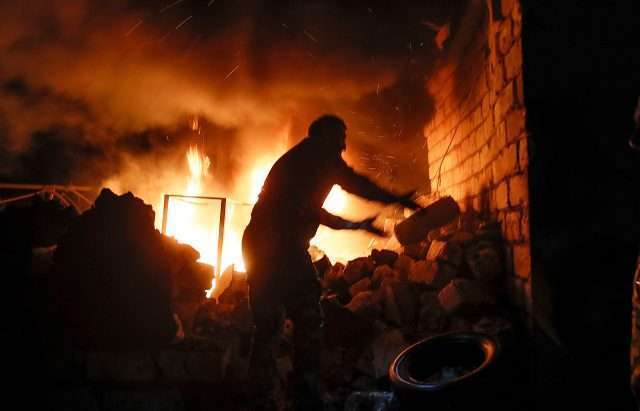Nagorno-Karabakh conflict might influence Moscow-Baku relations

Kavkaz Files ISSN 2975-0474 Volume 9 Issue 4
Author: Giuliano Bifolchi
The recent military escalation at the Nagorno-Karabakh/Azerbaijan border, which caused victims from both sides, could negatively affect relations between Moscow and Baku and plunge the region into a new geopolitical, security, and socio-political crisis.
At a time when Russia is facing difficulties deriving from the conflict in Ukraine and the Western sanctions, Nagorno-Karabakh is starting to heat up again due to the clashes that involved the Azerbaijani forces against the Nagorno-Karabakh Republic’s security forces. In this regard, Russia has accused Azerbaijani Armed Forces of having launched attacks with drones against the Nagorno-Karabakh army, not respecting the agreements stipulated between Moscow-Baku-Yerevan to maintain the region’s stability and promote the regional peace process.
According to Nagorno-Karabakh and local Russian sources, between March 24th-25th, 2022, the Azerbaijani military forces launched attacks against the Nagorno-Karabakh defence forces. They entered the area under the Russian peacekeepers’ control, violating the ceasefire. The truce was signed after 44 days of conflict, which in 2020 had allowed the Azerbaijani armed forces to conquer several territories that were previously under the control of the Republic of Nagorno-Karabakh/Artsakh but also caused the death of about 6,500 people and a regional humanitarian crisis.
Russia expressed itself “extremely concerned” about the growing tensions in the region and urged Azerbaijan to withdraw its troops; for the first time since the end of hostilities, Moscow accused one of the parties of violating the ceasefire.
The Azerbaijani Ministry of Defense responded to Moscow, calling the Russian statement “one-sided” and lacking truth. According to Baku, on the morning of March 26th, 2022, Armenian soldiers tried to sabotage some of the Azerbaijani military units at the border, provoking the clashes. Furthermore, Azerbaijan called for the withdrawal of the remaining Armenian troops and armed units of Nagorno-Karabakh from the internationally recognized territory of Azerbaijan, reaffirming the country’s commitment to the ceasefire, which entered into force on November 10th, 2020.
Armenia-Azerbaijan’s Tensions: A Risk assessment
Since the 1990s, the Nagorno-Karabakh conflict (often referred to as a “frozen conflict”) has influenced the security and dynamics of the Caucasus. In autumn 2020, the military escalation led to 44 days of conflict followed by a truce mediated by the Russian Federation. Consequently, Moscow deployed 2,000 troops as peacekeepers in the region to foster local stability.
The events of 2020 highlighted Azerbaijani’s superior military strength over Armenians and the role Turkey played in supporting Azerbaijan in its war effort. Over the years, the Russian Federation has always tried to control the Caucasus because the Kremlin considers this region part of its blizhnee zarubezhe (near abroad) and strategically important. If Armenia depends politically and militarily on Russia being also a member of the Eurasian Economic Union and the Collective Security Organization Treaty (CSTO), relations between Moscow and Baku have been swinging because Azerbaijan is Russia’s competitor in the European energy market and a key element in Brussels’ security energy strategy.
Russian-Azerbaijani relations in recent years have registered a marked improvement thanks to collaboration agreements in various sectors such as logistics and trade. For instance, recently, there was a meeting between the Russian and Azerbaijani representatives to discuss the “Green Corridor” to favour the transit of goods between Russia and Azerbaijan and help the Russian economy, which was heavily targeted by European economic sanctions.
On the one hand, Moscow must maintain stable relations with Baku, considering the importance that Baku plays in Russian foreign and economic policy in the Caucasus. On the other hand, the Kremlin must not lose the consensus and the alliance with Yerevan, which was severely tested during the 2020 Nagorno-Karabakh Conflict and the recent first military CSTO intervention in Kazakhstan in support of the Government of President Qasym-Zhomart Tokayev.
The progressive deterioration of the Nagorno-Karabakh situation and the resumption of the conflict could put the Russian Federation in a difficult position to manage a crisis in the Caucasus region in conjunction with military operations in Ukraine. Indeed, a possible escalation in the Nagorno-Karabakh would benefit Kyiv Government since the Secretary of the Security and National Defense Council of Ukraine, Oleksiy Danilov, recently requested Moldova and Georgia to open a second front and to engage the Russians in the ‘frozen conflicts’ of Transnistria/ Pridnestrovie and Abkhazia and South Ossetia.
Do you like SpecialEurasia reports and analyses? Has our groundbreaking research empowered you or your team? Now is your chance to be a part of our mission! Join us in advancing independent reporting and unlocking the secrets of Eurasia’s complex geopolitical landscape. Whether through a one-time contribution or a monthly/yearly donation, your support will fuel our relentless pursuit of knowledge and understanding. Together, let’s pave the way for a brighter future. DONATE NOW and secure your place in shaping the geopolitical narrative.
